Nine of the best team chat tools for making your team extra productive this year
With eight million active users and three million paid users, Slack is the darling of the business communication world. Indeed, the tool is hip and smart. It’s often praised for having multiple integrations, friendly UX and other features.
At the same time, Slack doesn’t work best for many teams. Some consider it expensive or cumbersome. Others find themselves buried under tons of notifications and constantly distracted while using it. In a word, the demand for an alternative communication tool is high and there’s plenty of Slack alternatives. But which one should you choose?
Developing our own Chanty team chat, we’ve explored many different apps and studied their pros and cons. Learning about different features our colleagues/competitors help us in making our app better. We decided to share with you what we’ve learned about Slack alternatives so you could make an informed decision about which app suits your needs best.
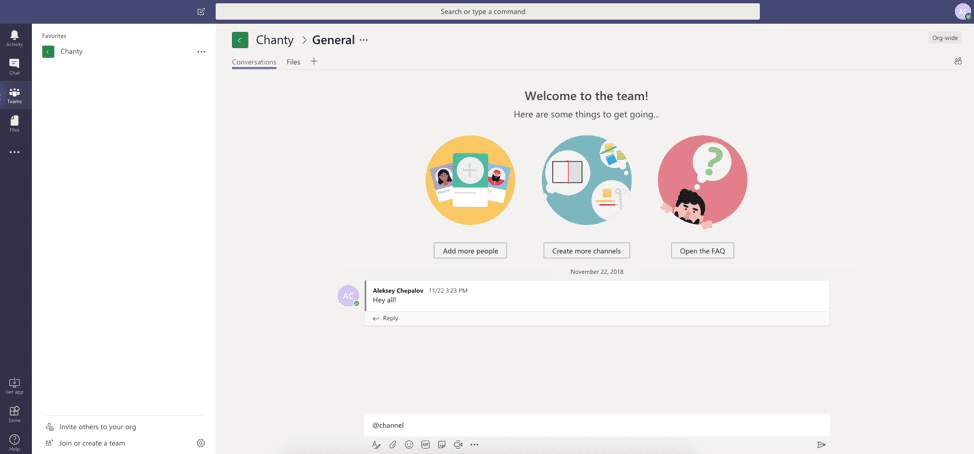
1. Microsoft Teams
Here’s Microsoft’s shot to catch up and overtake Slack. Rumor has it, initially, Bill Gates wanted to buy the famous team chat player but later decided to develop his own team tool. Before long, in November 2016 Microsoft Teams made its official launch.
One of the main pros of Microsoft Teams is that it has deep integrations with Office 365 tools. For example, you can share any Office or OneDrive document, access it and edit it, as can your team, without leaving the app. Some services (such as Word, Excel and PowerPoint) are available in the Freemium version, while others (Planner and Yammer) can be used in paid tiers only.
Designed initially for medium-to-large teams, Microsoft Teams may not be easy to deploy and admin. But if you are already on Business Essential or Premium Office 365 plans, using MT seems like a natural choice.
Available On
iOS, Android, Windows, macOS, and web
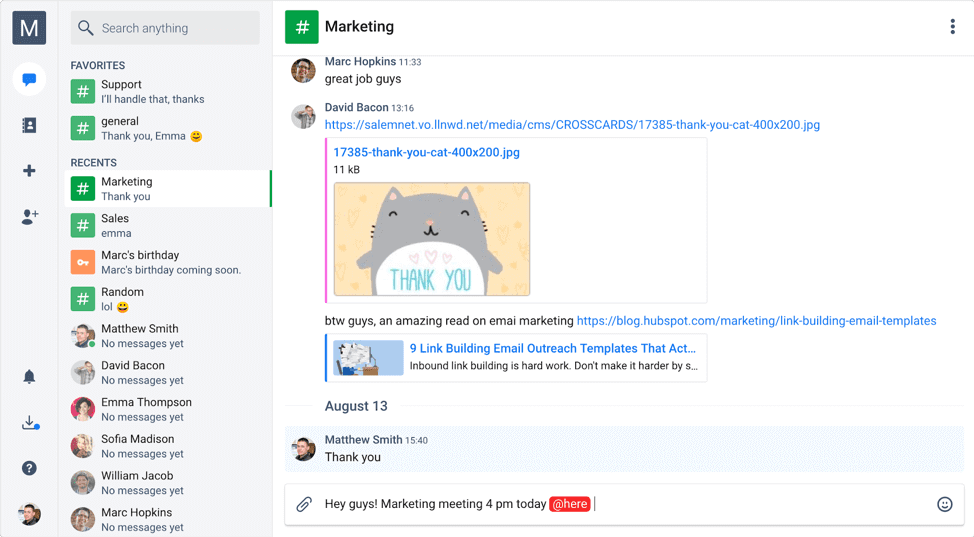
2. Chanty
Chanty is a powerful and easy-to-use team chat with unlimited message history. The tool features traditional chat functionality like public, private and one-to-one conversations. Links, files and pinned messages of every conversation are neatly organized making it easy to instantly find what you need. The built-in task manager allows turning any message into a task so you can discuss it in the task-related conversation.
Chanty is a freshly-minted tool, with many features to come in 2019. App integrations, team space management and workflows with threads are just around the corner. Now you can enjoy the super fast and easy communication in Chanty.
Chanty’s free plan is limited to 10 people on a team while its paid plans start at $3 per user, per month.
Available On
iOS, Android, Windows, macOS, and web
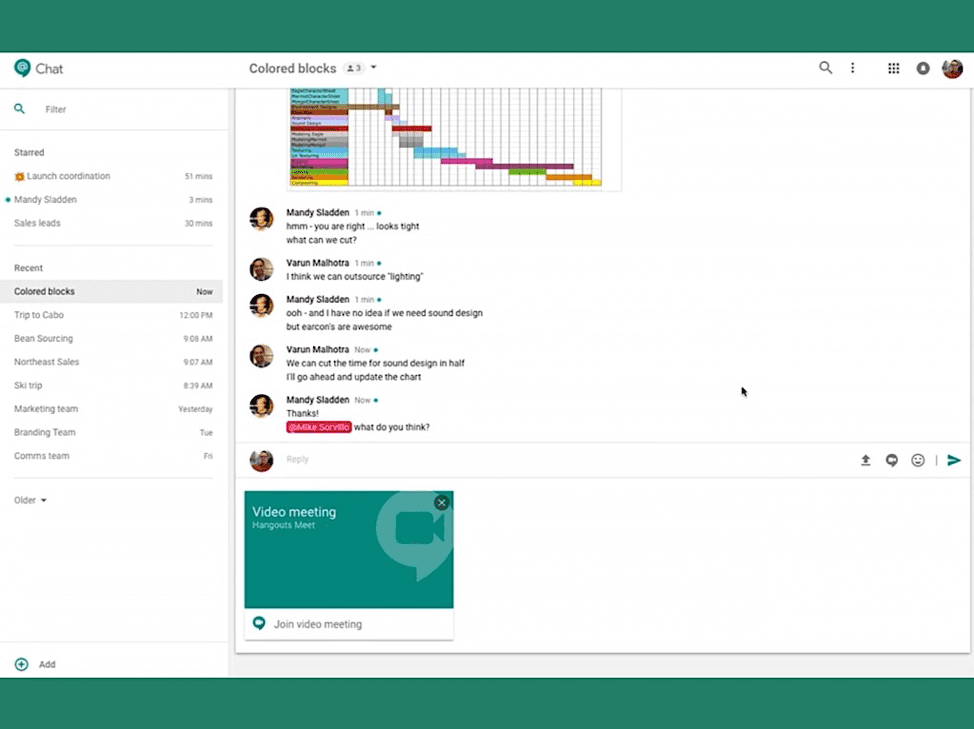
3. Hangouts Chat
Hangouts Chat is another new Slack alternative and was released in February 2018. The tool doesn’t have a Freemium tier so far. But if you happen to have a G Suite subscription, you’ll have automatic access to this team chat app.
Within the tool, you can send direct messages or communicate in rooms. Video calls are available via Hangouts Meet, 50+ third-party apps can be integrated via bots. The tool works with 28 different languages, which seems like a handy feature for multinational teams. Each conversation room can support up to 8,000 members.
Having released just recently, the tool is constantly adding new features. Lately, Hangouts Chat has added notification snoozing and Smart Reply feature. Apparently, the tool will see more adopters soon, as Hangouts “classic” might shut down in 2020 with its users being upgraded to Hangouts Chat and Hangouts Meet.
Available on
iOS, Android, macOS, and web
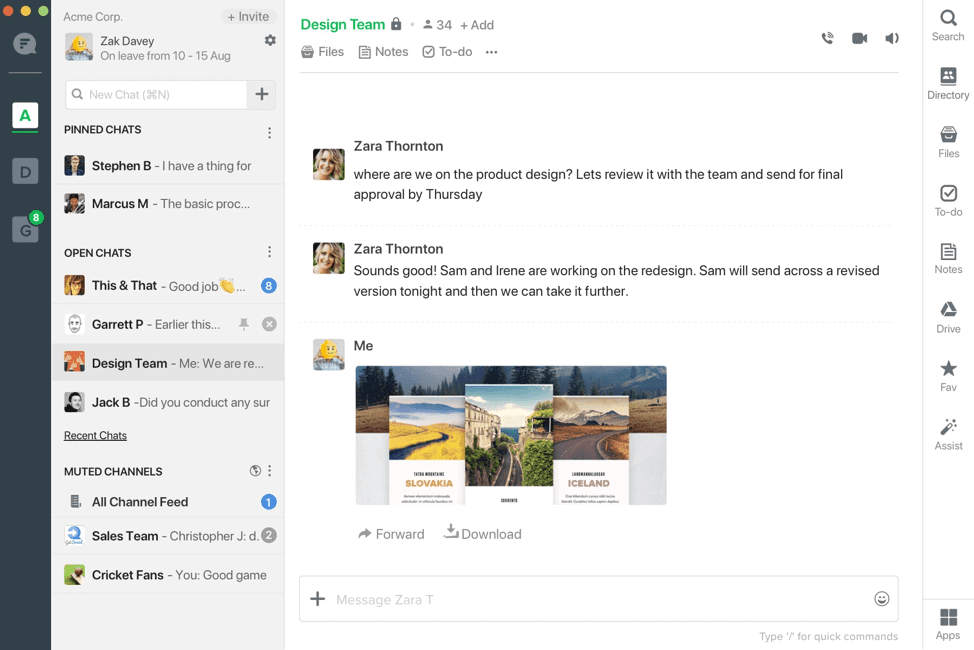
4. Flock
Flock is the Indian-based Slack competitor released in 2014. Its paid version is $2 cheaper than the Standard tier of its more famous rival. However, the Freemium version of both tools has the same drawback – 10,000 searchable messages. Flock’s Pro Plan removes this limit, also unlocking some convenient features like screen sharing and 10GB file storage per user.
While Slack relies on bots in providing Actions (Tasks) and Reminders, Flock counts on automation. The tool offers built-in instruments for creating polls, shared to-dos, notes, etc., so users don’t have to bother with formatting data correctly talking to a computer robot.
Over 50 apps (as of December 2018) including Zapier can be integrated with Flock. Also, the tool comes with free multi-channel guests so you can add your vendors or clients to join the workspace.
Available On
iOS, Android, Windows, macOS, Linux, and web
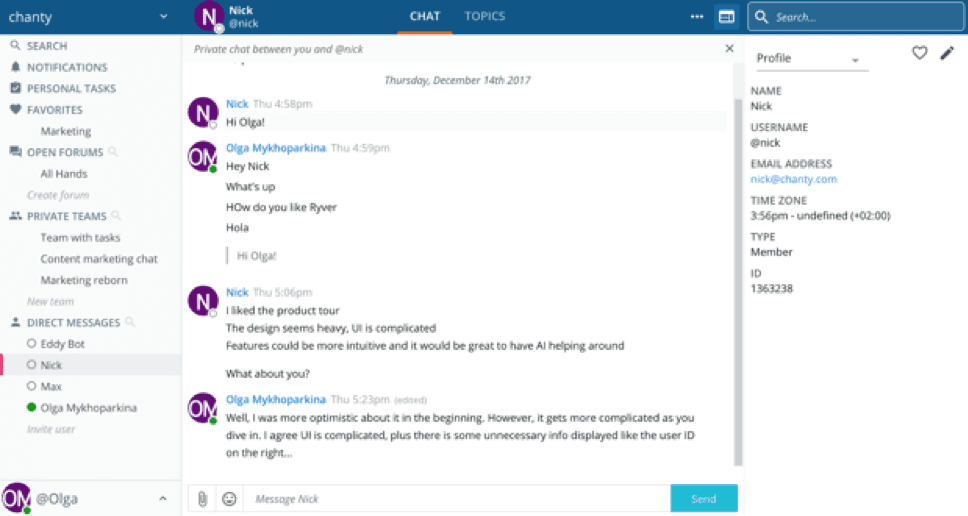
5. Ryver
Ryver’s key feature is a Trello-like task manager – you can turn messages into assignments and manage them with Kanban boards. Each team or user can create and operate their own sets of tasks. Instant messaging chats and threaded conversations can be reached separately via Chats and Topics menus. The voice and video calls in Ryver are built-in, while you can also integrate Ryver with over 500 other applications via Zapier.
Since 2018, Ryver doesn’t have a Freemium version. You can only try the tool for free for 14 days. Unlike many team chat tools, it charges for a team – not for a user. The cheapest price tag is $49 per month for a team of up to 12 users.
Available On
iOS, Android, Windows, macOS, and web
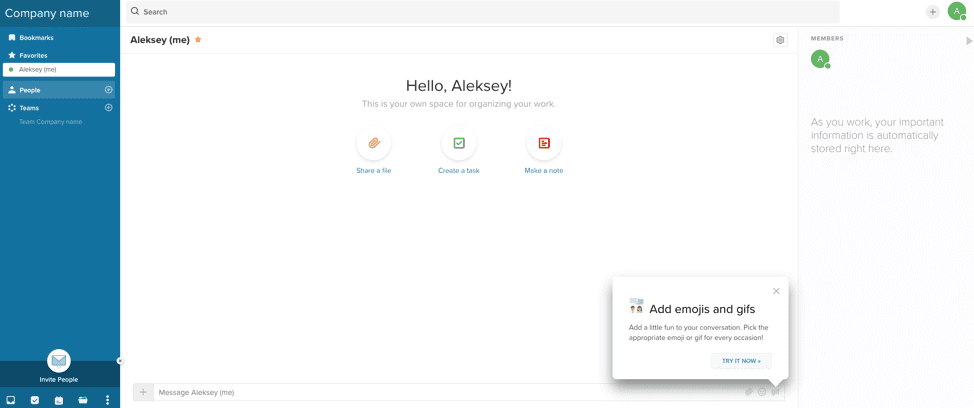
6. Glip
Glip is a team messaging and collaboration app, developed by the US-based cloud operator RingCentral. The tool has a generous freemium tier. Unlimited integrations, chat history, file sharing and some more features that are often paid, Glip provides for free.
The limitation, however, is placed on the number of shared video minutes – it’s 500 minutes per user, per month in the Freemium version. Paying $5 per user monthly you’ll lift, but not remove this restriction. In Glip’s Standard tier per user, you’ll get 1,000 minutes of video chat time.
The messaging is organized within Teams and one-to-one chats. The tool integrates with over 50 popular apps including Zapier and has built-in features like Tasks, Calendar and Notes.
Available On
iOS, Android, Windows, macOS, and web
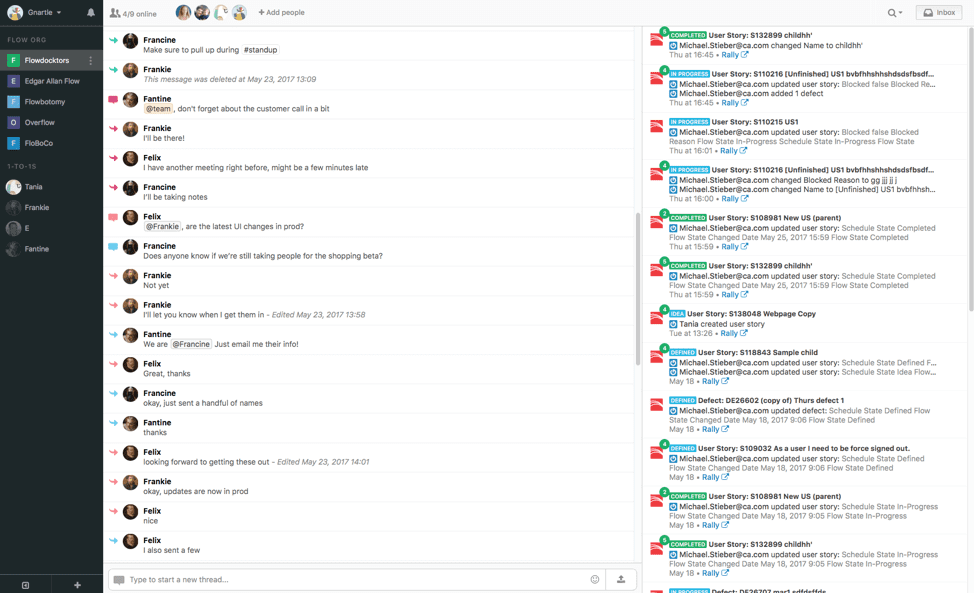
7. Flowdock
Flowdock is yet another veteran team chat launched back in 2009. Initially, designed for developers, it’s been adjusted for diverse kinds of businesses.
One of the main features of Flowdock is Team Inbox. This is where the updates from your tools are available – be it by email, tweets or 100+ integrations – so you can track and comment on them. Flowdock chats are organized by Threads. The conversations are colour coded so you can quickly identify a topic and jump back into the conversation. The video chat and screen sharing features are available through Appear.in. (If you need a voice chat you can switch off the cam).
Flowdock has no Freemium version unless you have a team up to five members.
Available On
iOS, Android, Windows, macOS, Linux, and Web
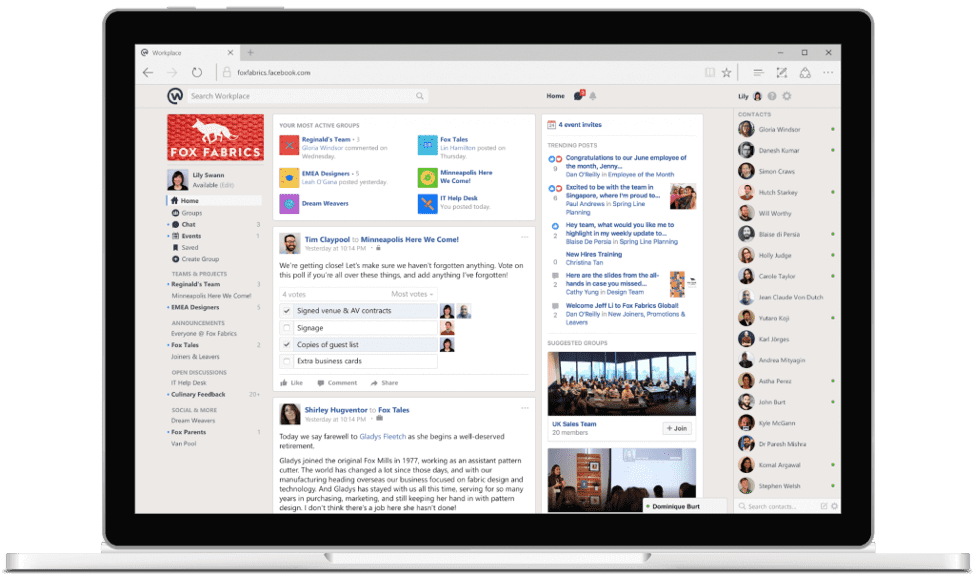
8. Workplace by Facebook
Can’t live without constantly checking your Facebook News Feed? Then chances are Workplace by Facebook is ideal for you. This tool provides the familiar design interface with quite unusual features for a team chat app. For example, you can create video coverage of a corporate event and broadcast it in real time for your team. Workplace accounts are separated from Facebook accounts for security purposes. Also, expect no ads in Workplace, as Facebook makes money from subscription fees.
Facebook Workplace has a Freemium version with unlimited storage and search. As for the integrations, only the file storage providers are free. To access other categories of apps, as well as some advanced features be ready to pay $3 per user, per month.
Available on
iOS, Android, Windows, macOS
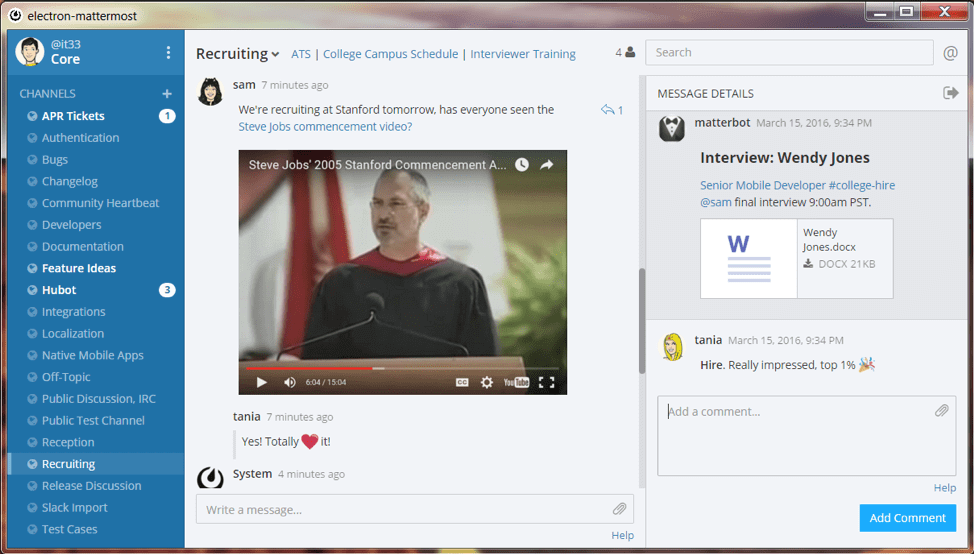
9. Mattermost
Mattermost is an open-source and private cloud Slack alternative. For those of you not tech-savvy, ‘open-source’ means you can adjust the tool to your needs, while ‘private cloud’ suggests you can host your digital workspace in your own environment to make it more secure.
Over 700 cloud-based applications are available through Zapier integration. Like in Slack, communication is organized in private, public channels and via direct messages.
Mattermost has a Freemium version with unlimited message history and multi-language support for smaller teams. Another freebie is the custom branding, which is usually paid in team chats. Mattermost fee-based plans start from $39 per user per year.
Available for
iOS, Android, Windows, Mac, Linux
Conclusion
As you can see, team chats and their features vary greatly. Some of the tools rely more on bots (Hangouts Chat), while others count on automation (Flock). Some use integrations heavily (Slack), while others develop a number of built-in tools (Glip). Some are designed primarily for big enterprises (Microsoft Teams), while others suit better smaller and medium businesses (Chanty).
Luckily, all the tools listed above are available for a free trial, so you can explore them firsthand to find which one best suits your needs. The most easy-to-use, fast and smart tool is likely to be a fit for you.
